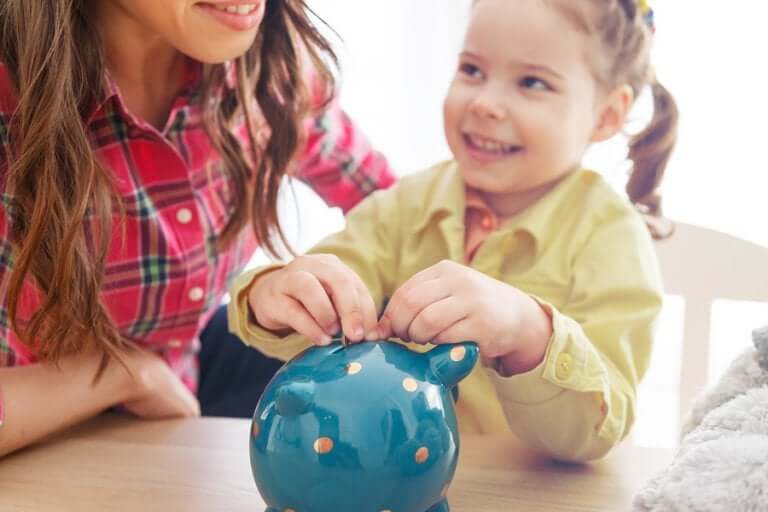How to Help Your Children Learn Basic Life Skills


Written and verified by the teacher Azucena Fernández
We’ve all heard or read stories about the importance of what we call basic life skills. These are the skills children need to acquire when they’re young and before they leave home.
Parents tend to focus their children’s education on school and then on high school. They help children in any way they can to succeed in their studies, and they’re happy knowing that they’ve got good grades. They know that, in this way, they’ll be able to get into a good university. However, this isn’t enough.
Let’s list some of the basic life skills for children to acquire early on. Without these basic skills, even the most qualified adult will be at a disadvantage in society, both in the workplace and in life in general.
Basic life skills for children to learn early on
Understanding money
One of the most important things that parents should teach their child is how to save money. This will help them greatly in their future lives. This includes understanding what it takes to manage money and knowing responsible ways to manage debt and invest in future goals.

Parents can start teaching their children about money as soon as they can talk. Talking with them about money has proven to be one of the most important ways to help them to understand it.
When they’re a little older, letting them handle money on their own provides a practical education. It also helps them understand how it works. It can also show them how to save up to buy something specific.
Learning to cook
Research shows that people who cook at home frequently eat more healthily and consume fewer calories than those who cook less. Therefore, teaching children to cook means that you’ll be helping them to have a healthier diet in the future.
In addition to this, home-cooked meals are almost always cheaper than processed or convenience food. Adults who know how to cook are also able to keep their food budgets under control. The first step to making children comfortable in the kitchen is to make sure they have safe and easy-to-use tools.
Being self-sufficient
Today’s companies complain that many new graduates, when they start work, need specific instructions for everything. They need help with even the simplest tasks. Most of these graduates have grown up in homes where their parents supported them throughout their lives. However, their parents have taken care of every single task.
Parental involvement in these areas is obviously beneficial to some extent. However, allowing children to experience some sort of independence and, above all, letting them discover some things for themselves, will favor their self-esteem. They’ll start to develop a positive attitude and see that they’re able to do a lot for themselves.
Knowing how to talk to strangers
Our children will meet many strangers throughout their lives: teachers, monitors, landlords, shopkeepers, co-workers, to name but a few.
They must know how to treat these people, how to communicate with them and maybe even how to defend themselves, if necessary. There’s obviously a fine line here. However, if children aren’t encouraged to talk to people they don’t know very well, then their communication skills will be affected. Parents have the unhelpful tendency to often speak on their child’s behalf.
Learning how to manage time independently
There are many adults who need to learn how to manage their time. The more that children understand and learn how to manage their time on their own, the more successful they’ll be in the future as adults.
Managing one’s time is a life skill that children need to learn for the future. They’ll need it for managing all their assignments in a busy college schedule and, in the future, to prioritize different tasks and projects at work.
Other basic life skills for children
Knowing how to do the laundry
For (most) adults, doing the laundry seems like a very natural task, but learning to do the laundry actually requires some guidance. It’s important for our children to understand how to use a washing machine and to understand the differences between a washing machine and a dryer, for example.

Learning to clean and maintain a house
One of the best ways to teach children how to clean and care for a house is by teaching them and making it a habit for them to carry out household chores. No matter how much we tell them why it’s important to keep the house clean, until they see for themselves how it’s done they won’t understand its importance.
This will be crucial in the future, when a child is older and maybe shares a flat or has a partner. It’s not simply a matter of learning how to clean a sink or scrub a floor; these tasks are actually preparing them to be successful in the future.
Looking after their things and being organized
We all know that being organized, and having everything in the right place, can make people more successful when performing their daily work. Some children and adults turn out to be naturally organized, but for those who aren’t, their parents can help.
For example, you can teach them how to create checklists, and how to create space for toys or schoolwork using shelves or containers. You can teach them to create routines, such as putting out their clothes and preparing their backpack for school the night before.
Although some of these basic life skills for children can be learned at school, such as managing their time or having cooking classes, many of them need encouragement and support from the parents.
We’ve all heard or read stories about the importance of what we call basic life skills. These are the skills children need to acquire when they’re young and before they leave home.
Parents tend to focus their children’s education on school and then on high school. They help children in any way they can to succeed in their studies, and they’re happy knowing that they’ve got good grades. They know that, in this way, they’ll be able to get into a good university. However, this isn’t enough.
Let’s list some of the basic life skills for children to acquire early on. Without these basic skills, even the most qualified adult will be at a disadvantage in society, both in the workplace and in life in general.
Basic life skills for children to learn early on
Understanding money
One of the most important things that parents should teach their child is how to save money. This will help them greatly in their future lives. This includes understanding what it takes to manage money and knowing responsible ways to manage debt and invest in future goals.

Parents can start teaching their children about money as soon as they can talk. Talking with them about money has proven to be one of the most important ways to help them to understand it.
When they’re a little older, letting them handle money on their own provides a practical education. It also helps them understand how it works. It can also show them how to save up to buy something specific.
Learning to cook
Research shows that people who cook at home frequently eat more healthily and consume fewer calories than those who cook less. Therefore, teaching children to cook means that you’ll be helping them to have a healthier diet in the future.
In addition to this, home-cooked meals are almost always cheaper than processed or convenience food. Adults who know how to cook are also able to keep their food budgets under control. The first step to making children comfortable in the kitchen is to make sure they have safe and easy-to-use tools.
Being self-sufficient
Today’s companies complain that many new graduates, when they start work, need specific instructions for everything. They need help with even the simplest tasks. Most of these graduates have grown up in homes where their parents supported them throughout their lives. However, their parents have taken care of every single task.
Parental involvement in these areas is obviously beneficial to some extent. However, allowing children to experience some sort of independence and, above all, letting them discover some things for themselves, will favor their self-esteem. They’ll start to develop a positive attitude and see that they’re able to do a lot for themselves.
Knowing how to talk to strangers
Our children will meet many strangers throughout their lives: teachers, monitors, landlords, shopkeepers, co-workers, to name but a few.
They must know how to treat these people, how to communicate with them and maybe even how to defend themselves, if necessary. There’s obviously a fine line here. However, if children aren’t encouraged to talk to people they don’t know very well, then their communication skills will be affected. Parents have the unhelpful tendency to often speak on their child’s behalf.
Learning how to manage time independently
There are many adults who need to learn how to manage their time. The more that children understand and learn how to manage their time on their own, the more successful they’ll be in the future as adults.
Managing one’s time is a life skill that children need to learn for the future. They’ll need it for managing all their assignments in a busy college schedule and, in the future, to prioritize different tasks and projects at work.
Other basic life skills for children
Knowing how to do the laundry
For (most) adults, doing the laundry seems like a very natural task, but learning to do the laundry actually requires some guidance. It’s important for our children to understand how to use a washing machine and to understand the differences between a washing machine and a dryer, for example.

Learning to clean and maintain a house
One of the best ways to teach children how to clean and care for a house is by teaching them and making it a habit for them to carry out household chores. No matter how much we tell them why it’s important to keep the house clean, until they see for themselves how it’s done they won’t understand its importance.
This will be crucial in the future, when a child is older and maybe shares a flat or has a partner. It’s not simply a matter of learning how to clean a sink or scrub a floor; these tasks are actually preparing them to be successful in the future.
Looking after their things and being organized
We all know that being organized, and having everything in the right place, can make people more successful when performing their daily work. Some children and adults turn out to be naturally organized, but for those who aren’t, their parents can help.
For example, you can teach them how to create checklists, and how to create space for toys or schoolwork using shelves or containers. You can teach them to create routines, such as putting out their clothes and preparing their backpack for school the night before.
Although some of these basic life skills for children can be learned at school, such as managing their time or having cooking classes, many of them need encouragement and support from the parents.
All cited sources were thoroughly reviewed by our team to ensure their quality, reliability, currency, and validity. The bibliography of this article was considered reliable and of academic or scientific accuracy.
- Beth Kobliner. (2017). Make Your Kid A Money Genius (Even If You’re Not): A Parents’ Guide for Kids 3 to 23.
- Wu, H. (1999). Basic skills versus conceptual understanding. American Educator
This text is provided for informational purposes only and does not replace consultation with a professional. If in doubt, consult your specialist.








